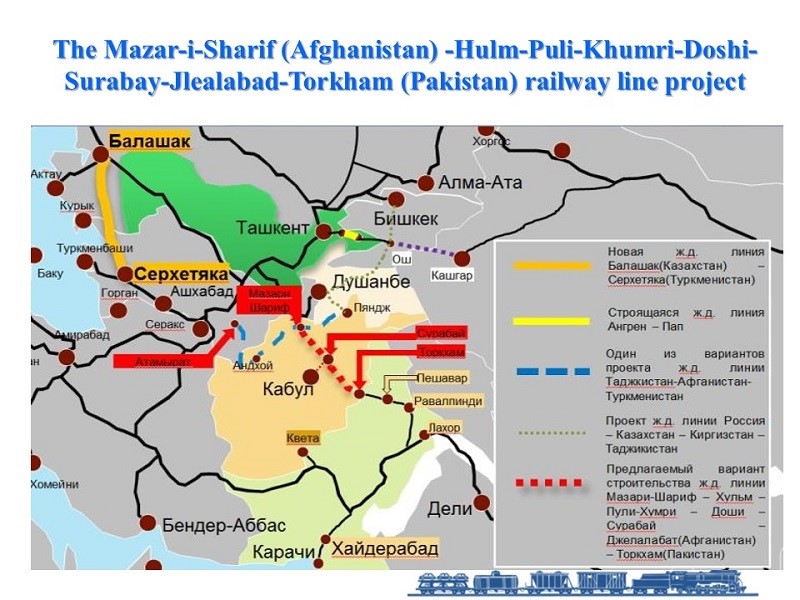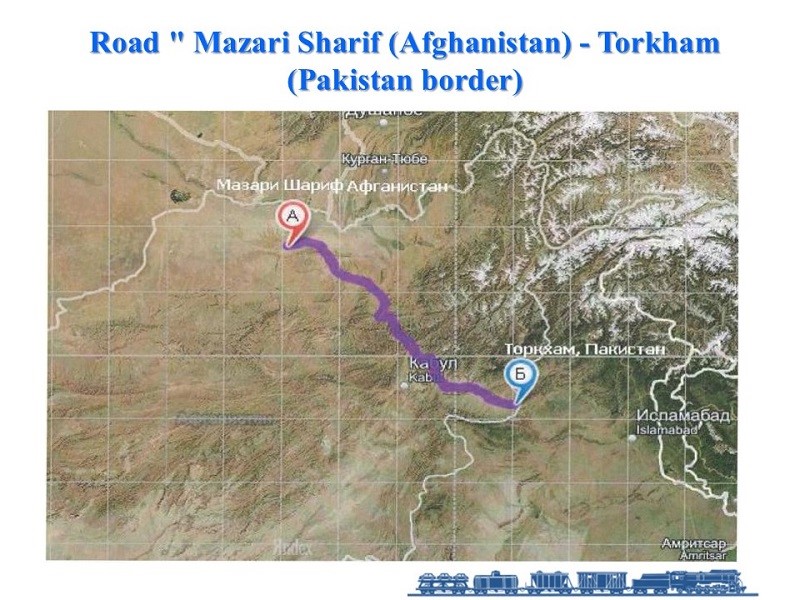Within the framework of the new regional policy pursued by Uzbekistan over the past five years to build constructive and mutually beneficial ties with neighboring countries, the development of cooperation with Afghanistan has been identified as one of the priorities. Uzbekistan has always advocated the early stabilization of the situation in this country, which is an important condition for ensuring regional security, creates more favorable opportunities for the development of the Uzbek economy, attracting investment and intensifying foreign economic activity.
At the same time, cardinal shifts have taken place in relation to Afghanistan, which is increasingly seen as an integral part of Central Asia. In the final document of the Consultative Meeting of the Heads of Central Asian States in 2019 in Tashkent, a regional consensus was consolidated on supporting the peace process, involving Afghanistan in regional ties and infrastructure projects.
In March 2018, a high-level international conference on Afghanistan was held in Tashkent: “The peace process, security cooperation and regional cooperation”. In his speech at the conference, President of Uzbekistan Sh.M.Mirziyoyev stressed the importance of implementing trans-Afghan transport and communication projects in Afghanistan for the development of intercontinental transport corridors from East to West and from North to South along the shortest routes.
In 2020, the head of our state set the task of intensifying cooperation with the countries of South Asia and work on the creation of the Trans-Afghan Transport Corridor. In February 2021, a meeting of the trilateral working group was held in Tashkent with the participation of government delegations of Uzbekistan, Pakistan and Afghanistan on the implementation of the Mazar-I–Sharif–Kabul-Peshawar railway construction project.
In order to solve these problems, the International Conference “Central and South Asia: Regional Interconnectedness – Challenges and opportunities” was initiated and held in July 2021 in Tashkent. In his speech at the conference, the President of Uzbekistan paid special attention to the issue of building a transport and logistics infrastructure that will effectively connect Central and South Asia. At the same time, it was stressed that the construction of the Termez-Mazar-I-Sharif-Kabul-Peshawar railway will allow to fully realize the transit potential of the two regions, form the shortest route, and will significantly reduce the time and costs of cargo transportation.
Image credit Uzbek Railway
It is important to note that the meeting was also attended by representatives of the World Bank, the Asian Development Bank, the European Bank for Reconstruction and Development, the European Investment Bank, the Islamic Development Bank, the Asian Infrastructure Investment Bank, the International Development Finance Corporation (USA), who confirmed their interest in the joint implementation of this project. Following the meeting, a joint action Plan for the Mazar-I-Sharif-Kabul-Peshawar railway construction project was adopted and the importance of implementing the project on the principle of public-private partnership was noted.
Meanwhile, the rise to power of the Taliban movement in Afghanistan has not weakened Uzbekistan’s desire to develop cooperation with Afghanistan. Thus, the President of Uzbekistan, in his speeches at the anniversary SCO summit, the SCO–CSTO meeting, and the 76th session of the UN General Assembly, which took place in September this year, again paid special attention to the Afghan problem, and called for preventing the isolation of Afghanistan. Uzbekistan, despite the difficult situation, did not stop the work of the Uzbek-Afghan transport hub – the most important artery for the supply of food and petroleum products to this country, as well as the uninterrupted supply of electricity to the neighboring country.
At the same time, Uzbekistan’s contacts with the new Afghan authorities have intensified in order to establish bilateral economic cooperation. On October 7 of this year, negotiations were held in Kabul between the delegation of Uzbekistan headed by the Minister of Foreign Affairs A.Kamilov and members of the interim Government of Afghanistan.
Image credit Uzbek Railway
On October 16 of this year, negotiations were held in Termez between the government delegations of Uzbekistan and Afghanistan at the level of deputy prime ministers, with the participation of representatives of various ministries and departments. During these meetings, issues of border security, cooperation in the fields of investment, mutual trade, energy, international cargo transportation and transit were discussed.
The sides paid special attention to the implementation of infrastructure projects, in particular the trans-Afghan railway “Termez-Mazar-I-Sharif-Kabul-Peshawar”. At the same time, the Afghan side expressed readiness to ensure the safety of Uzbek specialists involved in the implementation of this project.
Experts believe that this railway is a strategically important project and will connect the regions of Central and South Asia, as well as the Middle East. It will open up the possibility for Uzbekistan and other Central Asian countries to access Pakistani ports in the Indian Ocean and significantly increase the transit potential of Central Asia.
According to preliminary estimates, the length of the railroad will be about 600 km. The project implementation period can be up to 5 years, the amount of credit funds – $ 4.8 billion. The route will significantly reduce the time and cost of cargo transportation between the countries of South Asia and Europe through Central Asia, as well as increase the volume of transit traffic through Uzbekistan. With the full implementation of the project, the transportation of goods from Pakistan to Uzbekistan may take 3-5 days instead of 35, and the cost of transporting a 20-ton container may decrease by almost 3 times. According to forecasts, the volume of cargo transportation can reach up to 10 million tons.
The project will also contribute to the development of the transport network in Afghanistan, which remains in poor condition. The length of Afghanistan’s railways is about 100 km and runs in the border areas with Uzbekistan, Turkmenistan and Iran. The road network also requires further expansion and substantial investments.
In this regard, Uzbekistan’s proposals aimed at developing the transport infrastructure of Afghanistan, including the construction of the trans-Afghan railway route “Mazar–I–Sharif-Kabul- Peshawar”, are supported by the new authorities of the country and can be implemented.
In addition, this project is also beneficial to other countries of the region and the entire Eurasian continent, since developed transportation along the East-West vector can be supplemented by the formation of a connected transport and logistics network in the North-South direction with the shortest access to the markets of South, Southeast and West Asia. The development of trans-Afghan transit can contribute to the implementation on a mutually beneficial basis of a number of major interconnectivity initiatives, including the Russian “Great Eurasian Partnership”, the Chinese “One Belt, One Road” projects and the EU strategy for connecting Europe with Asia.
Of great importance is the fact that the creation of the Trans-Afghan Transport Corridor is an integral part of the infrastructure presented in the speech of the President of Uzbekistan at the Tashkent Conference of the comprehensive program for the development of interconnectedness and cooperation of the countries of Central and South Asia.
Tashkent’s initiatives provide for the development of cooperation between the two regions on a wide range of issues, including the formation of favorable conditions for the development of trade and economic ties and the growth of mutual investments, the introduction of digital platforms, the joint search for ways to ensure food security, the promotion of “green” development, the discovery of the tourism potential of the two regions and cultural and humanitarian cooperation.
The overall intensification of trade and economic cooperation and the development of sustainable commercial ties between the two regions, including a progressive increase in trade and transit traffic through Afghanistan using the existing transport and logistics infrastructure, will be important for the implementation of the railway construction project. In this regard, it is necessary to continue work on the formation of a legal framework for bilateral and multilateral trade relations between the countries of Central and South Asia, as well as the adoption of comprehensive trade facilitation measures to accelerate the movement of goods and border crossings.
All this will stimulate the growth of cargo transportation between the two regions and the demand for cargo transit through Afghanistan, which is necessary to attract investors’ interest in participating in the implementation of this major infrastructure project.
In the context of the development of the situation in Afghanistan, the resumption of work on the design of the Trans-Afghan Transport Corridor is also of great political importance. In fact, by continuing to work on the design and construction of a new railway, Uzbekistan and other project participants, including the new Afghan authorities, demonstrate a desire for positive interaction aimed at achieving long-term goals and objectives of improving the socio-economic situation, stabilizing and developing Afghanistan, its involvement in stable regional trade, economic, political and diplomatic ties.
Contacts with representatives of the interim Government of Afghanistan related to the design of the railway allow strengthening mutual understanding, creating conditions for broader interaction between Uzbekistan and other countries with the new regime in Kabul, assistance in national reconciliation in Afghanistan, stabilization of the situation in the country and in the region. The solution of these tasks, in turn, is necessary for the formation of a favorable environment for the financing and implementation of this megaproject.
In general, the construction of the trans-Afghan railway is an important infrastructure project that meets the interests of all states of the Eurasian continent and can have a huge positive impact on the development of Central Asian countries, trade and economic relations of Asian countries and their interregional interconnectedness, and will contribute to building mechanisms for long-term cooperation between states. At the same time, Afghanistan will become not an obstacle, but a bridge for strengthening mutually beneficial cooperation between Central and South Asia, other interested countries and regions. /// nCa, 1 December 2021 (in cooperation with Embassy of Uzbekistan in Ashgabat)
